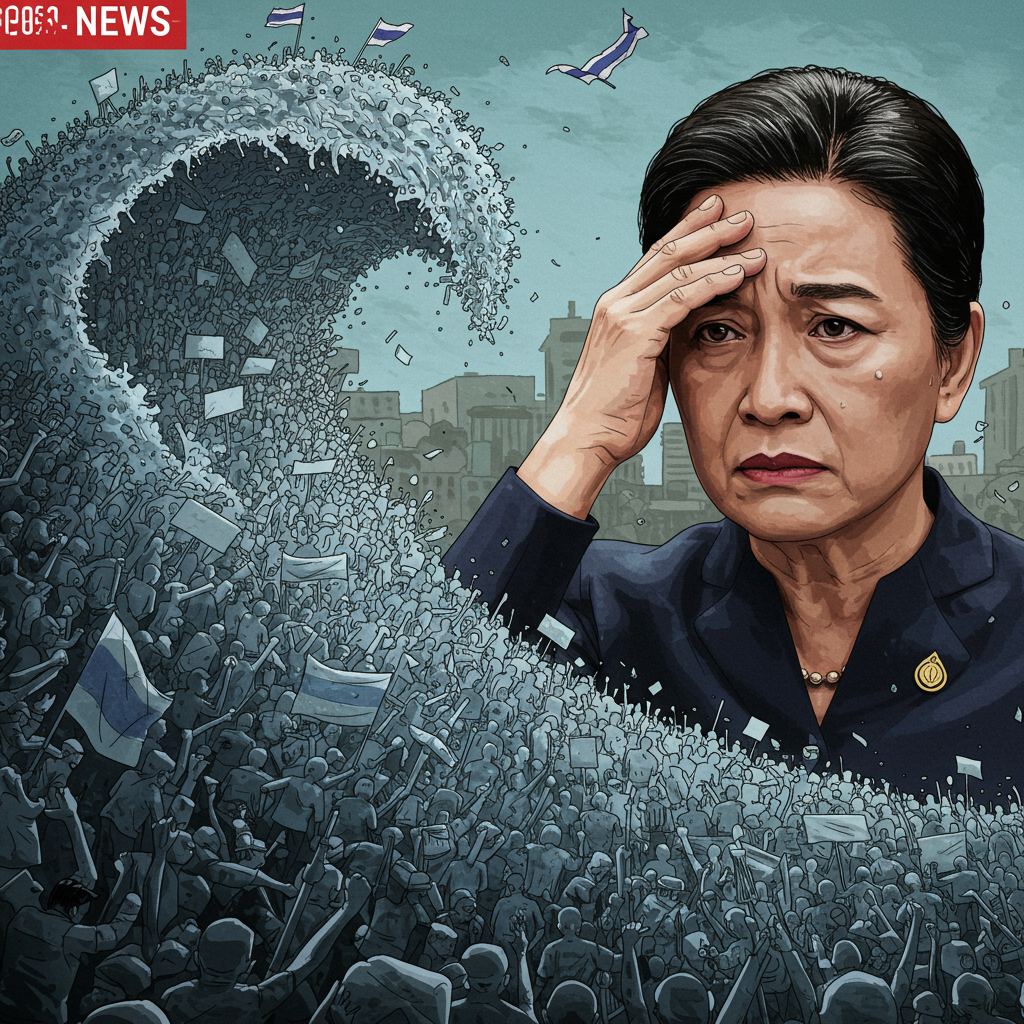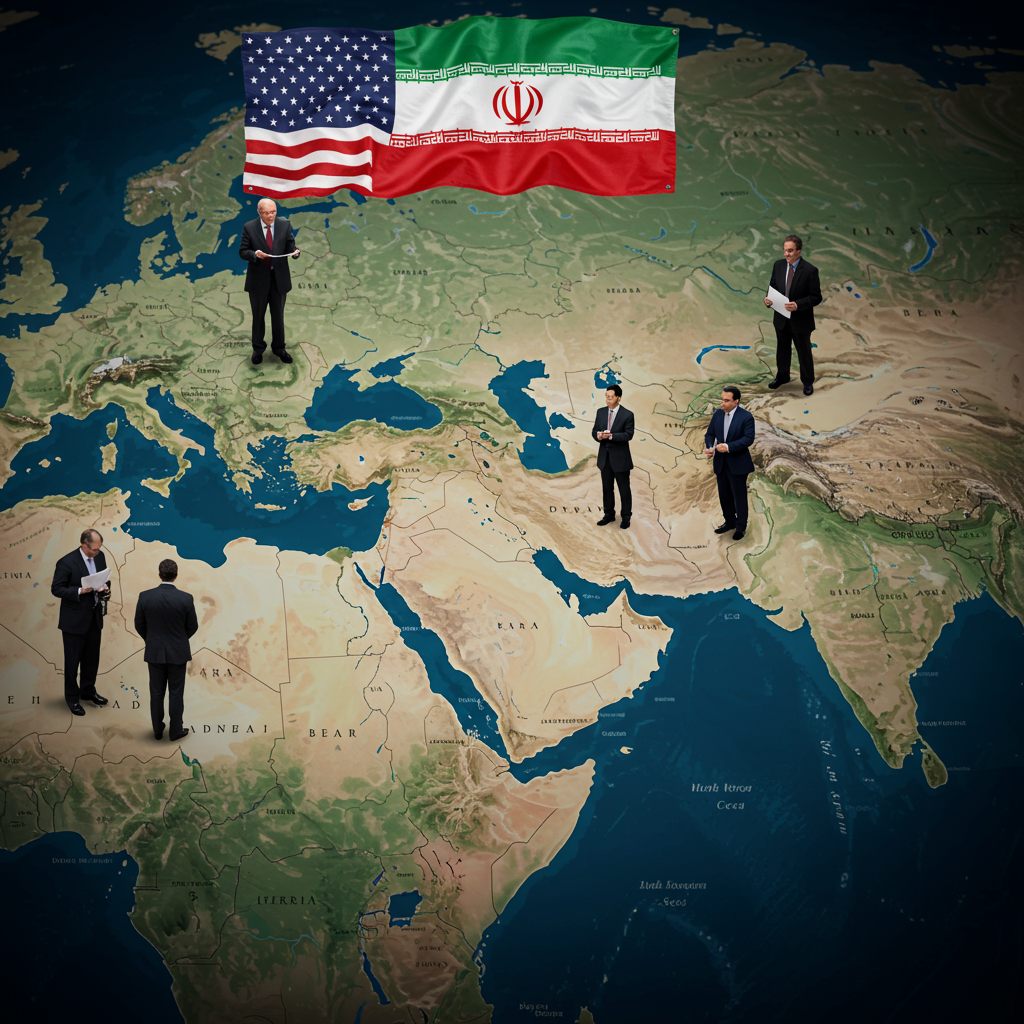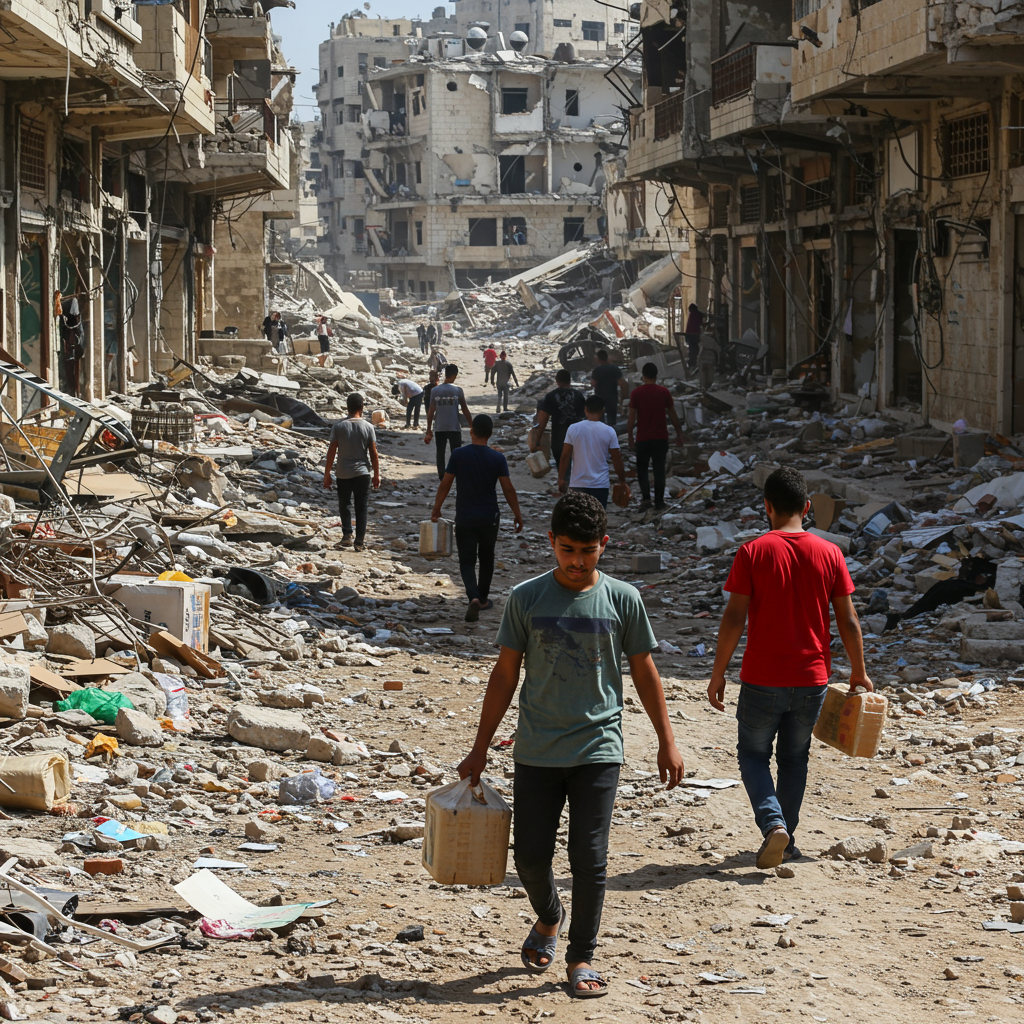Thousands of demonstrators recently converged on Bangkok, calling for the resignation of Thailand’s prime Minister, <a href="https://news.quantosei.com/2025/06/24/thailand-bans-tourists-from-going-to-cambodia-as-border-dispute-persists/” title=”Thailand Bans Travel to Cambodia Amid Escalating Border Dispute”>paetongtarn Shinawatra. The large-scale protest, held on a rainy Saturday, was directly triggered by the leak of a controversial phone call between the Prime Minister and former Cambodian leader Hun Sen. This incident has ignited public anger, fueled long-standing political tensions, and put significant pressure on the fragile coalition government.
The fallout from the call centers on perceived unprofessionalism and concerns over national sovereignty, particularly in the context of a recent border dispute with Cambodia. As the country navigates this political storm, observers are closely watching the unfolding events, including potential legal challenges that could determine the Prime Minister’s future.
Thousands Rally in Bangkok Demanding Resignation
On Saturday, June 28, 2025, Bangkok’s Victory Monument became the focal point of significant public discontent. Thousands of protesters, estimated by police to be around 20,000, gathered to voice their demand for Prime Minister Paetongtarn Shinawatra to step down. This marked the largest anti-government demonstration seen since the ruling Pheu Thai party assumed power in 2023.
Despite challenging monsoon rain, demonstrators filled the area, blocking roads and carrying Thai flags alongside placards emblazoned with powerful slogans. Messages like “PM is enemy of state” and chants using the Prime Minister’s nickname, such as “Ung Ing, get out,” resonated through the crowd. Many protesters also held umbrellas, adapting to the weather conditions. As the rain subsided, a rainbow reportedly formed over the monument, a symbolic moment for some.
Voices from the Demonstration
Protest leaders articulated the movement’s core grievances. Parnthep Pourpongpan, a key figure, stated plainly that the prime minister “should step aside because she is the problem.” His comment directly linked the call for resignation to Paetongtarn’s actions and handling of recent events.
Many attendees traveled considerable distances to participate. Seri Sawangmue, a 70-year-old who journeyed overnight by bus from northern Thailand, exemplified the depth of feeling. He told reporters he was there “to protect Thailand’s sovereignty” and to assert that the PM was “unfit” for office. Having witnessed numerous political crises throughout his life, he added, “I’ve lived through many political crises and I know where this is going,” hinting at potential escalation or instability.
The rally was organized by a coalition with a history spanning over two decades, consistently protesting against governments led by the Shinawatra family. This group read a statement to the assembled crowds, arguing that the executive branch and parliament were failing to act “in the interest of democracy and constitutional monarchy.” Many participants were identified as members of the conservative, pro-royalist Yellow Shirts group, known for their strong opposition to the Shinawatra political dynasty.
The Controversial Leaked Phone Call
The immediate catalyst for the widespread protest was a leaked phone call that took place on June 15 between Paetongtarn Shinawatra and Cambodia’s former Prime Minister, now Senate president, Hun Sen. The private conversation, intended to discuss a recent incident on the shared border, quickly became public and sparked intense criticism across Thailand.
During the call, Paetongtarn reportedly addressed Hun Sen using the informal term “uncle,” a gesture critics interpreted as showing excessive deference or “kowtowing.” More significantly, she is alleged to have criticized a Thai military commander involved in the border dispute, stating he “just wanted to look cool and said things that are not useful.” Sources also suggest she urged Hun Sen not to pay attention to this “other side” in Thailand, specifically referring to the outspoken general.
This critique of a Thai military official by the Prime Minister during a conversation with a foreign leader, especially concerning a sensitive border issue, drew widespread condemnation. Public anger mounted quickly following the leak.
Prime Minister’s Response and Defense
Prime Minister Paetongtarn has publicly addressed the controversy. She offered an apology for her specific comments during the call but defended the conversation itself as a “negotiation technique.” Before traveling to inspect flood-hit areas, she acknowledged the public’s right to protest, emphasizing the condition that demonstrations remain peaceful.
In an attempt to mitigate the fallout, she later stated that she would no longer hold future phone calls with the former Cambodian leader. Despite these explanations, many Thai people, according to protest leaders like Parnthep, feel that Paetongtarn and her influential father are being manipulated by Hun Sen, fueling further distrust. Hun Sen himself confirmed he had shared the audio clip with 80 politicians, leading to the leak, and later posted the entire 17-minute recording on his Facebook page.
Complex Border Tensions and Historical Context
The leaked call occurred against a backdrop of heightened tensions on the Thai-Cambodian border. A specific incident on May 28 in a small, contested area resulted in an armed confrontation where a Cambodian soldier was killed. This clash significantly worsened ties between the two nations, marking one of their lowest points in over a decade.
The tensions between Thailand and Cambodia regarding their shared border are deeply rooted in history, dating back over a century to the period when borders were demarcated following the French occupation of Cambodia. A prominent point of contention has been the area surrounding the ancient Preah Vihear Buddhist temple. The International Court of Justice ruled in 1962 that the land surrounding the temple belonged to Cambodia, a decision reaffirmed in 2013 during the premiership of Paetongtarn’s aunt, Yingluck Shinawatra. Sporadic clashes have occurred around this site, including significant skirmishes in 2011.
In response to the recent flare-up and ongoing disputes, both countries have imposed border restrictions. Cambodia has also banned Thai imports ranging from food and electricity to television dramas and cinema, signaling the strained diplomatic relationship.
The Shinawatra-Hun Family Connection
Adding another layer of complexity is the long-standing personal connection between Thailand’s powerful Shinawatra family and Cambodia’s dominant Hun family. Despite the current national tensions, Hun Sen and Paetongtarn’s father, Thaksin Shinawatra, share a decades-long friendship and reportedly consider each other “godbrothers.” Critics argue that these personal ties may unduly influence official state matters, particularly concerning border negotiations, contributing to the perception that Thai interests might be compromised.
Hun Sen, speaking from Phnom Penh on the same day as the Bangkok protest, publicly accused the Thai army of a “serious violation” of Cambodia’s sovereignty and territorial integrity during the May skirmish. He contrasted Cambodia’s history of suffering with its current position of rising on an “equal face” with other nations, reinforcing his stance on the border issue.
Political Ramifications and Legal Challenges
The scandal stemming from the leaked phone call has had significant political repercussions for Prime Minister Paetongtarn Shinawatra and her administration. The current ruling coalition, led by the Pheu Thai party, was already navigating a delicate political landscape. The fallout from the call led to the departure of its largest coalition partner, the Bhumjaithai Party. This withdrawal has reduced the remaining 10-party coalition to a slim majority, holding just 255 seats in the 500-seat House of Representatives, highlighting the fragility of the government’s position.
Paetongtarn’s position is further complicated by her family’s prominent and often controversial role in Thai politics. At 38 years old, she is the daughter of Thaksin Shinawatra, a former prime minister who was deposed in a military coup in 2006 and returned from 15 years of exile in August 2023. She is also the niece of Yingluck Shinawatra, another former prime minister ousted by a coup in 2014. Paetongtarn, who has been in office for just 10 months, is the country’s second female prime minister, following her aunt. The protesters’ call for an “end to Shinawatra leadership” reflects the deep-seated opposition faced by the family across generations.
Looming Legal Battles
Adding immediate pressure, Prime Minister Paetongtarn is facing crucial legal challenges. The Constitutional Court is scheduled to decide on Tuesday, June 30, 2025, whether to accept a petition filed by senators seeking her removal from office. This petition specifically alleges unprofessionalism related to the controversial phone call with Hun Sen. If the court decides to accept the case, it could potentially suspend her from duty while the investigation proceeds, a scenario that has played out with previous prime ministers from the Pheu Thai party.
Concurrently, the national anti-corruption agency (NACC) is also conducting an investigation. Sarote Phuengrampan, the NACC secretary-general, confirmed that the agency is looking into whether Paetongtarn committed a serious breach of ethics concerning the call. While no timeline for this investigation has been provided, the combination of the court petition and the NACC probe represents a significant legal threat to her premiership. Despite the mounting pressure, Paetongtarn has publicly maintained that she is not worried, is prepared to provide evidence, and believes the call did not cause damage to the country.
The current political climate underscores the enduring divisions within Thailand, where historical grievances and concerns over governance and national interest frequently converge with the long-standing opposition to the Shinawatra family’s political influence. The outcome of the legal challenges and any continued public demonstrations will be critical in determining the path forward for Thailand’s government.
Frequently Asked Questions
Why are thousands protesting Thai Prime Minister Paetongtarn Shinawatra?
Thousands are protesting primarily because of public outrage over a leaked phone call between Prime Minister Paetongtarn and former Cambodian leader Hun Sen. Critics view her comments during this call, particularly those addressing Hun Sen as “uncle” and criticizing a Thai military commander involved in a border dispute, as unprofessional and potentially detrimental to Thailand’s sovereignty. The protest also reflects broader, long-standing opposition to the Shinawatra family’s political influence in Thailand.
What were the key issues discussed in the leaked phone call with Cambodia’s Hun Sen?
The leaked call focused on a recent border incident between Thailand and Cambodia, which resulted in a Cambodian soldier’s death. Controversially, Paetongtarn reportedly addressed Hun Sen informally as “uncle” and made critical remarks about a Thai army commander responsible for the border area, suggesting he was only trying to “look cool.” The call is seen by many as undermining Thai interests and showing excessive deference to the former Cambodian leader.
What legal challenges could Prime Minister Paetongtarn face following this scandal?
Prime Minister Paetongtarn is facing at least two significant legal challenges. The Constitutional Court is set to decide if it will accept a petition from senators seeking her removal over alleged unprofessionalism regarding the call; acceptance could lead to her suspension. Additionally, the national anti-corruption agency (NACC) has confirmed it is investigating her for a potential serious breach of ethics related to the phone call, adding further pressure to her position.
Conclusion
Prime Minister Paetongtarn Shinawatra faces a significant challenge to her authority following a large protest in Bangkok triggered by a leaked phone call with Cambodia’s Hun Sen. The controversy, rooted in comments perceived as undermining national interests and disrespecting the military, has reignited historical opposition to the Shinawatra family and highlighted ongoing border tensions. With legal cases potentially looming in the Constitutional Court and NACC, the coming days and weeks will be critical in determining the stability of her government and the future of Thailand’s political landscape.




